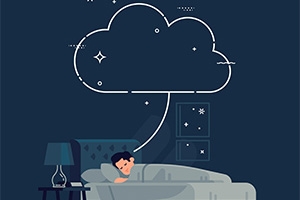How to Drift Off to Sleep Effortlessly
7 tips to help you fall asleep, stay asleep, and awaken refreshed
 'Sleep knits up the ravelled sleeve of care.' William Shakespeare
'Sleep knits up the ravelled sleeve of care.' William ShakespeareWhat makes you happy? Riches? Beautiful clothes? Come on, we can do better than that. What about wonderful experiences? A glimpse of sunshine gently sliding though winter trees? A job well done? A skill mastered? Shared time with a friend or lover? Skipping through a meadow?
How about a good night's sleep?
It seems that we are not terribly good at really knowing what makes us happy. And it's a case of first things first. Sleep is something we all take for granted until it doesn't work properly. When we don't sleep well, all of the above becomes harder to enjoy (imagine meadow skipping on two hours' sleep). When you have slept well, pleasures can be fully enjoyed and difficulties more easily surmounted. It really does seem that a good night's sleep (like many of life's seemingly 'small pleasures') makes us happy (1).
As I write this, I feel focussed, relaxed, upbeat, and energetic - partly, I suspect, because I slept so darn well last night. I drifted off to sleep momentarily after my head collided with the pillow, slept deeply and dreamlessly, and awoke feeling supercharged.
I've written elsewhere about easy and effective ways to sleep better (2), how to clear your mind, and many of the so called 'sleep hygiene' tips, but feel inspired to write this because of the exceptional sleep I experienced last night. So here are a few more ideas I hope you'll find useful to get you sleeping blissfully.
1) Spend time on your feet during the day
Let's see... yesterday I went for a beautiful walk, perhaps about eight miles. I've noticed before that if I've been on the train up to London (standing all the way because spare seats are scarce), then spend hours standing and walking around the capital, I always sleep like the proverbial log. Whereas more intense exercise surrounded by hours of sitting down doesn't produce the same happy soporific effect.
If you were to spend four or five hours today on your feet, I guarantee your next sleep would be delicious and deep. We evolved to be upright when awake and this sends the message to the brain that when we're not upright, it's time to sleep. And if at least some of this on-your-feet time can be taken outside, all the better (3).
2) Drift off to sleep by ensuring you're horizontal
Falling asleep in an upright position may give us some rest, but we'll never get into the really deep recuperative slow-wave depth that we'll have when lying down properly. If you've ever slept the night in a car, you'll know what I mean (help me out here; other people must have done that, too). Make sure you are as horizontal as possible whilst being as comfortable as possible. The more upright we are, the more our brain gets the message that we need to be awake and alert. (See previous tip.)
3) Don't worry about how much sleep you think you'll get
So many people lie awake worrying about how many hours they'll sleep and whether it will be 'enough'. There's no better recipe for insomnia than this. Relax - we can all get by on less sleep for a while. Sure, sleep is vital for healthy immune function, metabolism, physical and mental health, and memory.
However, it's not always how much you get but the quality of it that counts. In fact, too much sleep may be as bad for you as too little. Psychologists from the University of California found that people who slept between 6½ and 7½ hours had a lower mortality rate than people who slept for eight hours or more (4).
4) Socialize with people you like
What else did I do yesterday? Well, in the evening I met up with some friends and we had a real laugh. Serotonin, the 'feel good chemical', is produced in the brain when we have good times around people we like. Of course you can't always have wonderful social times, but improving your social life may just help you drift off more easily because of the uplifting feel good effects.
5) Eat before bedtime
Let me qualify that. Eat a high-protein snack several hours before bed; a handful of nuts might be a good idea. Doing this provides the L-tryptophan needed to produce melatonin and serotonin, both of which will have you rapidly falling into deep blissful slumber. You can also eat a small piece of fruit. This can help the tryptophan cross the blood-brain barrier.
6) Don't eat before bedtime
Let me qualify that. Avoid dairy, wheat, or sugary products, as they can spoil sleep quality and prevent you drifting off to sleep. These types of food can impact sleep quality, preventing you reaching the deeper levels of sleep, where real rejuvention happens; excess congestion, which will make it harder to get to sleep and stay asleep; and stomach cramps and gas, which may prevent your partner from sleeping, as well - or in fact talking to you in the morning.
7) Remember when
Of course worrying, 'mind churning', and not being able to 'switch off' are part and parcel of not getting to sleep and in my other articles I address how to overcome night-time worrying in more depth. But another useful way to help you slide into slumber, drift into drowsiness, and float into felicity is to use this following mind exercise:
Begin to vividly recall a time when you've naturally and irresistibly felt yourself sliding into deep sleep. Whenever we remember something in great detail, our body and mind align to the memory. For example, I can recall a time when I hadn't slept for three nights (due to crazy shift work and untreated toothache).
I can vividly recall, when I finally had some time off and pain-relieving dental treatment, going to bed and intensely enjoying those few moments of inevitable drifting into sleep. Focussing on this memory - where I was, the particular bed, even thinking about the proceeding hours before I was 'allowed' to sleep - really makes me feel tired and sleepy. If you can't actually think of a time like this, you can just imagine the experience.
Follow these tips and, who knows, sometime very soon you may be feeling very happy. : )
For more help, see our sleep hypnosis downloads.

Get a free hypnosis session with our Sleep Well app for iPhone & Android
Includes our most popular sleep session free, with the option to upgrade to 12 more sessions.
Get the Sleep Well app for iOS (iPhone or iPad) here or for Android here.
References
- According to a survey published in the Daily Mail on the 30th December 2009.
- See " How to Cure Insomnia Naturally" and: " 5 Restful Ways to Fall Asleep Fast" .
- Natural daylight helps shut off your body's production of melatonin, a hormone produced at night that makes you drowsy. This can help you maintain a normal circadian rhythm, so you're more likely to feel tired at bedtime when it's dark outside. Going outside for 15 minutes at the same time each day, preferably in the morning, gives your body a clear signal that it's no longer night. Also, forgo the sunglasses if possible, since this will enable sunlight to pass unhindered through your eyes to the brain's pineal gland, triggering the gland to stop releasing melatonin.
- Professor Daniel Kripke of the University of California, San Diego, reviewed a massive Japanese study that found the optimal sleep time was between 5 and 7½ hours. More or less than this correlated with higher mortality rates. The original Japanese Collaborative Cohort Study (JACC) enrolled 104,000 subjects aged 40 to 80, asked them about their sleep habits, and followed them for 10 years.








